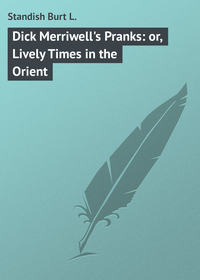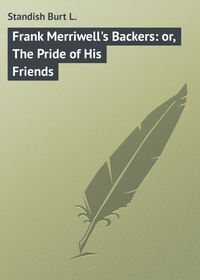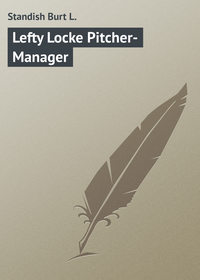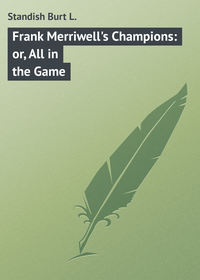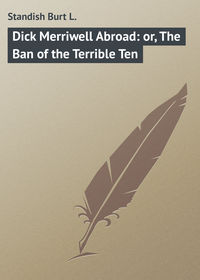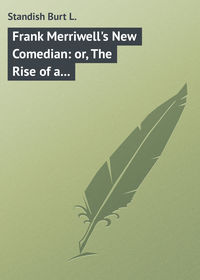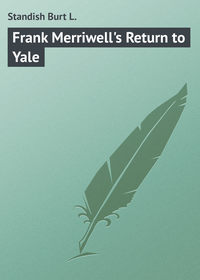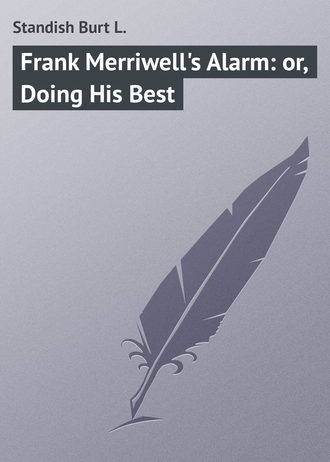 полная версия
полная версияFrank Merriwell's Alarm: or, Doing His Best
Diamond’s hands shook so with eagerness that he nearly spilled the water, and he greedily turned it down his parched throat at a gulp.
“Merciful goodness! how sweet!” he gasped. “More, Frank – more!”
“Wait a bit, my boy. You have had the first drink from this hole. The others must take their turn now. When it comes around to you again, you shall have more.”
“But there may not be enough to go around!” Jack almost snarled. “What good do you think a little like that can do a fellow who is dying of thirst? I must have more – now!”
“Well, you can’t have another drop till the others have taken their turn – not a taste!”
When Frank spoke like that he meant what he said, and Jack knew it. But the little water he had received had maddened Diamond almost as much as had the mirage. As Frank turned toward the water-hole, Jack started to spring upon him, crying:
“We’ll see!”
“Hold on!” said Browning, as one of his hands went out and grasped Diamond. “I wouldn’t do that. You are excited. I reckon I’ll have to sit on you, while you cool off.”
Then the big fellow took Jack down, and actually sat on him, while the Virginian raved like a maniac.
“Poor fellow!” said Frank, pityingly. “He has almost lost his reason by what he has passed through.”
One by one the others received some of the water, and then it came Jack’s turn once more. By this time he was silent, but there was a sullen light in his eyes. When Frank passed him the water in the drinking cup he shook his head, and refused to take it.
“No!” he muttered. “I won’t have it! Drink it all up! You don’t care anything about me! Let me die!”
“Well, hang a fool!” snorted Browning, in great disgust.
“Say, jes’ yo’ pass dat wattah heah, Marser Frank, an’ see if dis coon’ll refuse teh let it percolate down his froat!”
“Yes, give it to Toots!” grated Diamond. “You think more of him than you do of me, anyway! Give it to him!”
“Don’t chool with that fump – I mean don’t fool with that chump!” snapped Rattleton. “Let him have his own way! He’s got a bug in his head; that’s what ails him.”
“Let him alone, Bruce,” said Frank, quietly. “I want to talk to him.”
“He struck at you behind your back.”
“Never mind; he won’t do so again.”
“Oh, you don’t know!” muttered Diamond.
“Yes, I do,” declared Frank, with confidence.
“Never mind us, fellows. I want a little quiet talk with Jack.”
They understood him, and the two lads were left alone.
CHAPTER III. – THE SKELETON
Frank began talking to Diamond in a smooth, pleasant way, appealing to his sense of justice. At first Jack turned away, as if he did not care to listen, but he heard every word, and he was affected.
“You are not yourself, old fellow,” said Frank, softly, placing his hand gently on Diamond’s shoulder. “If you were yourself you would not be like this. It is the burning desert, the blazing sun, the frightful thirst – these have made you unlike yourself. I don’t mind anything you have said about me, Jack, for I know you are my friend, and you would not think of saying such things under ordinary circumstances. A little while ago, away out on the desert, you told me that much. It was then that reason came back to you for a little while. Knowing how you have suffered, I gave you the first drink from this water-hole. The water ran in slowly, and I did not know that there would be enough to go around twice. You were not the only one who had suffered from thirst, but the others made no objection to your having the first drink – they wanted you to have it. But it was necessary that they should have some of the water, so that all of us would be in condition to search for the other water-hole. Surely, old fellow, you see the common sense of this. And now, Jack, look – the water has cleared, and more is running into the hole. It will quench your thirst, and you will be yourself again. You are my friend, and I am yours. We stand ready to fight for each other at any time. If one of my enemies were to try to get at me behind my back, why, you would – ”
“Strangle the infernal cur!” shouted Diamond. “Give me that water, Frank! You are all right, and I’m all wrong! Just let me have a chance to fight for you, and see if I don’t fight as long as there is a drop of blood in my body!”
Merriwell had conquered, but he showed no sign of triumph, although he quietly said:
“I knew all the while, dear old fellow; in fact, I believe I know you better than you know yourself.”
Then, when the others came up, ready to jolly Diamond about refusing to drink, Frank checked them with a gesture.
Jack felt better when he had taken a second drink of water. As water had risen in the hole, all the boys were able to get another round, and the spirits of all of them were raised.
“I believe we have some hard bread and jerked beef, haven’t we, Merry?” asked Browning.
“Yes.”
“Well, we are all right, then. Can’t knock us out now. All I need is a good chance to rest.”
“Oh, you need rest!” nodded Rattleton. “You always need that. You can take more rest and not complain than any fellow I ever saw.”
“Young man,” said Bruce, loftily, “it won’t work. I refuse to let you get me on a string, so drop it.”
“You’ll be lucky if you get out of this part of the country without getting on a string with the other end hitched to the limb of a tree.”
“That reminds me,” drawled Bruce; “at the last town where we stopped I asked a citizen if there were any horse thieves in that locality, and he said there were two of ’em hanging around there the night before.”
“Yes,” nodded Harry, “that was the place where they said they were going to stop lynching if they had to hang every durned lyncher they could catch.”
“Boys,” laughed Merriwell, “we are all right. When you chaps get to springing those things I feel there is no further danger. We’ll pull out all right.”
“Suttinly, sar,” grinned Toots. “I’s gwan teh bet mah money on dis crowd ebry time, chilluns. We’s hot stuff, an’ dar ain’t nuffin’ gwan teh stop us dis side ob San Francisco – no, sar!”
Finally, refreshed and filled with new hope, the boys mounted their wheels and started to seek for the second water-hole.
Frank led the way, and they turned to the south, riding along the base of some barren cliffs.
“Are you sure we’ll be able to find our way back to the water-hole we have left if we fail to discover the other one?” asked Rattleton.
“I am taking note of everything, and I do not think there will be any difficulty,” answered Frank.
They had proceeded in this manner for about two miles when they saw before them a place where the barren cliffs opened into a pass that seemed to lead into the mountains.
“There is our road!” cried Merriwell, cheerfully. “It should lead us straight to the second water-hole.”
“Yah! yah!” laughed Toots. “Cayarn’t fool dat boy, chilluns! He knows his business, yo’ bet! Won’t s’prise me a bit if he teks us stret to a resyvoyer – no, sar!”
They made for the pass, and, in a burst of energy, the colored boy spurted to the front, taking the lead.
Of a sudden, as they approached a point where the bluffs narrowed till they were close together, the negro gave a sudden wild howl of terror, tried to turn his wheel about and went plunging headlong to the ground.
“Wow!” gasped Rattleton. “What’s struck him?”
“Something is the matter with him, sure as fate,” said Frank.
Toots was seen to sit up and stare toward the wall of stone, while it was plain that he was shaking as if struck by an attack of ague. Then he tried to scramble up, but fell on his knees, with his hands clasped and uplifted in a supplicating attitude, while he wildly cried:
“Go ’way, dar, good Mr. Debbil! I ain’t done nuffin’ teh yo’! Please don’ touch me! I’s nuffin’ but a po’ good-fo’-nuffin’ nigger, an’ I ain’t wuff bodderin’ wif – no, sar! Dar am some white boys wif me, an’ I guess yo’ll lek them a heap sight better. Jes’ yo’ tek one of them, good Mr. Debbil!”
“Has he gone daffy, too?” muttered Frank, in astonishment.
Then the boys came whirling up and sprang from their wheels, at which Toots made a scramble for Frank, caught hold of his knees, and chatteringly cried:
“Don’ yeh let him kerry me off, Marser Frank! I knows yo’ ain’t afeared of nuffin’, so I wants yeh ter protect po’ Toots from de debbil wif de fiery eyes!”
But Frank was so astonished that he scarcely heard a word the colored boy uttered.
Seated on a block of stone in a niche of the wall was a human skeleton. It was sitting bolt upright and seemed to be staring at the boys with eyes that flashed a hundred shades of light.
“Poly hoker – no, holy poker!” palpitated Harry, leaning hard on his wheel. “What have we struck?”
For a time the others were speechless.
Wonderfully and fantastically was the skeleton decorated. On its head was a rude crown that seemed to be of glittering gold, while gold bracelets adorned its arms. About the fleshless neck was a chain of gold, to which a large locket was attached, and across the ribs was strung a gold watch-chain, while there were other fantastic and costly ornaments dangling over those bones of a human being.
The eyes of the skeleton, flashing so many different lights, seemed to be two huge diamonds of enormous value.
No wonder the young cyclists stared in astonishment at the marvelously bejeweled skeleton!
“Well,” drawled Browning, with his usual nonchalance, “the gentleman seems to have dressed up in his best to receive us. Some one must have sent him word we were coming.”
Toots, seeing the others did not seem frightened, had got on his feet and picked up his bicycle.
“Goodness!” muttered Diamond. “If all those decorations are solid gold, there is a small fortune in sight!”
“What is the meaning of this, Frank?” asked Rattleton. “How do you suppose this skeleton happens to be here?”
“Ask me something easy,” said Merriwell, shaking his head.
“The skeleton must have been decorated in that manner by some living person,” asserted Rattleton.
“But where is that person?”
“Not here, that is sure.”
“It may be a warning,” said Jack, gloomily.
“Warning, nothing!” exclaimed Frank. “It is plain the thing has been left there by some person, and we are the discoverers. It must be that the skeleton is that of some poor devil who perished here for want of water.”
“And it may be that the one who placed it there perished also,” said Rattleton.
“Very likely.”
“In which case,” came eagerly from Jack’s lips, “all that treasure belongs to us! Boys, it is a wonderful stroke of fortune! We have made enough to take the whole of us through Yale, and – ”
“If we ever get back to Yale, old fellow! This unfortunate fellow perished here, and our fate may be similar.”
“Boo!” shivered Browning. “That’s pleasant to think about!”
“More than that,” Frank went on, “the treasure does not belong to us if we can find the real owner or his heirs.”
The excitement and interest of the boys was great. They were eager to examine the decorations of the mysterious skeleton.
“We’ll stack our wheels, and then one of us can climb up and make an inspection,” said Frank.
So they proceeded to stack their wheels, Toots observing:
“Yo’ can fool wif dat skillerton if yo’ wants to, chilluns, but dis nigger’s gwan teh keep right away from it. Bet fo’ dollars it will jest reach out dem arms and grab de firs’ one dat gits near it. Wo-oh! Land ob wartermillions! it meks me have de fevah an’ chillins jes’ to fink ob it!”
“We’ll draw lots to see who goes up,” said Frank, winking at the others. “You will have to go if it falls to you, Toots.”
“Oh, mah goodness!” gasped the frightened darky. “I ain’t gwan teh draw no lots, Marser Frank – no, sar! I’s got a po’erful bad case ob heart trouble, an’ mah doctah hab reckermended dat I don’t fool roun’ no skillertons. He said it might result distrus if I boddered wif skillertons.”
“What’s that?” cried Frank, sternly. “Would you drink your share of water when water is so precious and not take even chances with the rest of us in any danger?”
“Now, Marser Frank!” cried the darky, appealingly; “don’ go fo’ to be too hard on a po’ nigger! De trubble wif me is dat I’m jes’ a nacheral bo’n coward, an’ I can’t git over hit nohow. Dat’s what meks mah heart turn flip-flops ebry time dar’s any dangar, sar.”
“But think of the treasure up there that we have found. If it should fall to you to investigate, and you were to bring down that treasure, of course you would receive your share, the same as the rest of us.”
“Lawd bress yeh, honey! I don’ want no treasure if I’ve goter go an’ fotch hit down. I’d a heap sight rudder nebber hab no treasure dan git wifin reachin’ distance of dat skillerton – yes, sar!”
“Don’t fool with him, Merry,” said Diamond, impatiently. “Of course you don’t expect to send him up, and you won’t think of giving him any part of the treasure.”
Frank flashed a look at the Virginian, and saw that Jack was in earnest.
“You are mistaken, old man,” he said. “I do not expect Toots to go up there, but, if there is a real treasure and it is divided, you may be sure he will receive his share.”
“Oh, well!” cried Jack, somewhat taken aback; “of course I don’t care what you do about that, but I thought you were in earnest about what you were saying.”
“The trouble with you,” muttered Rattleton, speaking so low that Jack could not hear him, “is that you never see through a joke.”
“Come,” spoke Browning, “if we’ve got to take chances to see who goes up and makes the examination, come on. I hope to get out of it myself, but if I must, I must.”
“We need not take chances,” said Frank, promptly. “I will go.”
“It will not be difficult, for it is no climb at all,” said Jack. “Two of us can swing ourselves up there in a moment, and I will go with you, Merry.”
Then it was that Rattleton suddenly gave a great cry of stupefied amazement.
“What’s the matter?” asked Merriwell.
“Look! Look!” gasped Harry, pointing toward the niche in the rocks. “The skeleton – it has disappeared!”
They looked, and, dumb for the time with amazement and dismay, they saw Rattleton spoke the truth.
The mysterious skeleton had vanished!
CHAPTER IV. – “INDIANS!”
“Gone!” cried Jack.
“Sure!” nodded Frank.
“Lordy massy sakes teh goose-grease!” gasped Toots, again shivering with terror. “Didn’t I done tole yeh, chilluns! If yo’ know when yo’ am well off, yeh’ll git erway from heah jes’ as quick as yeh can trabbel! Oh, mah goodness!”
Shaking in every limb, the colored boy tried to get his bicycle out from the others, lost his balance, fell over, and sent the entire stack of wheels crashing to the ground.
“Well, this seems to be a regular sleight-of-hand performance,” coolly commented Browning. “Now you see it, and now you don’t; guess where it’s gone. It drives me to a cigarette.”
But he discovered that his cigarettes were gone, which seemed to concern him far more than the vanishing of the skeleton. He declared he had lost a whole package, and seemed to feel quite as bad about it as if they were solid gold.
Rattleton was excited.
“What sort of pocus-hocus – no, hocus-pocus is this, anyway?” he spluttered. “Where’s it gone? Who wayed the old thing a took. I mean who took the old thing away?”
“It couldn’t have gone away of its own accord,” said Frank, “so some one must have removed it.”
“Don’ yeh fool yo’se’f dat way, Marser Frank!” cried Toots, sitting up amid the fallen wheels. “Dat skillerton am de berry ol’ scratch hisse’f! De next thing some ob dis crowd will be disumpearin’ dat way. Gwan ter git kerried off, chilluns, if yo’ don’ git out ob dis in a hurry.”
“Oh, shut up!” snapped Diamond. “You make me tired with your chatter!”
“Mistah Dimund,” said the colored boy, with attempted dignity, “if yo’ll let dat debbil kerry yo’ off yo’ll nebber be missed – no, sar.”
Jack pretended he did not hear those words.
“Here goes to see what has become of the thing!” cried Frank, as he scrambled up to the niche where the skeleton had sat.
“I am with you!” cried Diamond, as he followed Frank closely.
Reaching the nook in the face of the cliff, they looked about for some sign of the skeleton that had been there a short time before, but not a sign of it could they see. The ghastly thing was gone, and the glittering ornaments had vanished with it. The block of stone on which the object had sat was still there.
“Well, fat do you whind – I mean what do you find?” cried Rattleton, impatiently.
“Not a thing,” was the disgusted reply. “It has gone, sure as fate!”
“So have my cigarettes!” groaned Browning.
“The treasure – is any of that there?” asked Harry, eagerly.
“Not a bit of it.”
“Well, that’s what I call an unfair deal,” murmured Bruce. “It is a blow below the belt. If the old skeleton had desired to go away, none of us would have objected, but it might have left the trimmings with which it was adorned.”
Frank was puzzled, and the more he investigated the greater grew his wonder. He knew they had seen the skeleton, yet it had vanished like fog before a blazing sun.
Jack shrugged his shoulders and shivered, saying:
“There’s something uncanny about it, old man. I believe it is a warning.”
“Nonsense!” cried Frank. “What sort of a warning?”
“A warning of the fate that awaits all of us.”
“You are not well, Jack.”
“Oh, it is not that! First we see a lake of water, and that disappears; then we see this skeleton, and now that has vanished. You must confess that there is something remarkable in it all.”
“The vanishing of the mirage came about in a natural manner, but – ”
“But you must confess there was something decidedly unnatural about the vanishing of the skeleton.”
“It was removed by human hands – I will wager anything on that.”
“Then where is the human being who removed it?”
“I don’t know.”
Unable to remain below, Rattleton came climbing up to the niche.
“I’ve got to satisfy myself,” he said, as he felt about with his hands, as if he expected to discover the vanished skeleton in that manner. “I can’t see how the blamed old thing could get away!”
“Well, you can see quite as well as we can,” acknowledged Frank. “It is gone, and that is all we can tell about it.”
The boys satisfied themselves that the thing had really disappeared, and they could not begin to solve the mystery. After a time they returned to the ground.
“It am de debbil’s work!” asserted Toots. “Don’ yeh mek no misteks ’bout dat, chilluns.”
They held a “council of war,” and it was resolved that they should go on through the pass and try to find the second water-hole before darkness fell.
Already night was close at hand, and they must needs lose no time.
“We can come back here in the morning and see if we’re able to solve the mystery,” said Merriwell. “I, for one, do not feel like going away without making another attempt at it.”
“Nor I,” nodded Rattleton.
“It is folly,” declared Jack, gloomily. “I say we have been warned, and the best thing we can do is get away as soon as possible.”
“By golly! dat am de firs’ sensibul fing I’ve heard yo’ say in fo’ days!” cried Toots, approvingly.
They picked up their wheels, and soon were ready to mount.
“Here’s good-by to the vanishing skeleton for to-night,” cried Frank.
He was answered by a wild peal of mocking laughter that seemed to run along the face of the cliff in a most remarkable manner.
“Ha! ha! ha!” it sounded, hoarsely, and “Ha! ha! ha!” came down from the rocks, like a mystic echo.
“O-oh, Lordy!”
Toots made a jump for the saddle of his bicycle, but jumped too far and went clean over the wheel, striking his knee and turning in the air, to fall with a thump on the back of his neck.
“Mah goodness!” he gurgled, as he lay on the ground, dazed by the shock of the fall. “De ol’ debbil done gib meh a boost then fo’ suah!”
The other lads looked at each other in perplexity.
“Well, wh-wh-what do you think of that?” stammered Rattleton.
“He ought to file his voice, whoever he is,” coolly observed Browning. “It’s a little rough along the edges.”
“It strikes me that somebody is having fun with us,” said Merriwell, a look of displeasure on his face.
“What are you going to do about it?” asked Harry.
“We don’t seem able to do much of anything now. Come on.”
Toots scrambled up, and they mounted their wheels. As they started to ride away, a hollow-sounding voice cried:
“Stop!”
“Oh, riv us a guest – I mean give us a rest!” flung back Rattleton.
“Stop!” repeated the mysterious voice. “Do not try the pass. There is danger beyond. Turn back.”
“I told you it was a warning!” cried Jack. “What do you think of it now?”
“I think somebody is trying to have a lot of sport with us!” exclaimed Frank.
“Well, what are you going to do?”
“Not a thing. I don’t propose to pay any attention to it, Come on, fellows. We must have more water, and there’s none too much time to find it before dark.”
Diamond was tempted to declare he would not go any further, but he knew the others would stand by Frank, and so he pedaled along.
As they drew away from the spot where they had seen the skeleton, they heard the mysterious voice calling to them again, commanding them to stop and turn back. Thus it continued till they had ridden on so that it could be heard no longer.
Despite himself Frank had been impressed by what he had seen and heard, and a feeling of awe was on him. Ahead the shadows were thick where the dark cliffs seemed to come together, and there was something grim and overpowering about the bare and towering mountains that sullenly frowned down upon the little party.
The boys were silent, for they had no words to speak. Each was busy with his thoughts, and those thoughts were not of the most pleasant character.
A feeling of heart-sickening loneliness settled down upon them and made them long for the homes that were so far away. What satisfaction was there, after all, in this great ride across the continent? They had encountered innumerable perils, and now it seemed that they were overshadowed by the greatest peril of all.
How still it was! The mountains seemed like crouching monsters of the great desert, waiting there to spring upon and crush them out of existence. There was something fearsome and frightful in their grim air of waiting.
The whirring of the wheels was a warning whisper, or the deadly hiss of a serpent. As they passed between the frowning bluffs, which rose on either hand, the whirring sound seemed to become louder and louder till it was absolutely awesome.
Frank looked back, and of all the party Bruce Browning was the only one whose face remained stolid and impassive. It did not seem that he had been affected in the least by what had happened.
“He has wonderful nerve!” thought Merriwell.
Diamond’s dark face seemed pale, and there was an anxious look on the face of Rattleton. Toots betrayed his excitement and fear most distinctly.
Frank feared they would not get through the pass in time to find the second water-hole, and he increased his speed.
The ground was favorable for swift riding. At that time Merriwell thought it fortunate, but, later, he changed his mind.
Of a sudden the pass between the bluffs ended, and they shot out into a valley or basin.
A cry of astonishment and alarm came from Frank’s lips, and he used all his energy to check and turn his flying wheel.
Before them blazed a fire, and around that fire were gathered —
“Indians!” palpitated Harry Rattleton.
CHAPTER V. – BLUE WOLF TRIES THE BICYCLE
“Indians!” echoed Jack Diamond.
“Indians?” grunted Bruce Browning, astonished.
“O-oh, Lordy!” gasped Toots. “Dis am whar a nigger boy I know is gwan teh lose his scalp fo’ suah!”
“Turn!” commanded Frank – “turn to the left, and we’ll make a run to get back through the pass.”
But they were seen, and the redskins about the fire sprang to their feet with loud whoops.
At the first whoop Toots gave a howl and threw up both hands.
“Don’ yo’ shoot, good Mistar Injunses!” he shouted. “I’s jes’ a common brack nigger, an’ I ain’t no ’count nohow. Mah scalp wouldn’ be no good teh yo’ arter – ”


